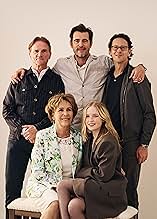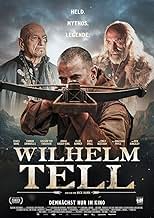En el siglo XIV, en los días del Sacro Imperio Romano Germánico, cuando las naciones de Europa compiten ferozmente por la supremacía y los ambiciosos austríacos, que desean más tierras, inva... Leer todoEn el siglo XIV, en los días del Sacro Imperio Romano Germánico, cuando las naciones de Europa compiten ferozmente por la supremacía y los ambiciosos austríacos, que desean más tierras, invaden Suiza, una nación serena y pastoral.En el siglo XIV, en los días del Sacro Imperio Romano Germánico, cuando las naciones de Europa compiten ferozmente por la supremacía y los ambiciosos austríacos, que desean más tierras, invaden Suiza, una nación serena y pastoral.
- Dirección
- Guionistas
- Elenco
- Premios
- 1 nominación en total
- Dirección
- Guionistas
- Todo el elenco y el equipo
- Producción, taquilla y más en IMDbPro
Resumen
Reviewers say 'William Tell' is lauded for its strong performances, stunning cinematography, and historical authenticity. The narrative of rebellion against tyranny resonates, though dialogue and pacing receive mixed feedback. Some find the script theatrical, and the middle section drags. Historical accuracy and character portrayals are debated. Despite these issues, the film's epic scope and emotional depth make it a compelling historical drama.
Opiniones destacadas
I knew nothing about this film going in but sometimes taking a gamble and going in blind can pay off when you find yourself watching a hidden gem. "William Tell" however is just an average watch.
I found the film quite hard to follow because (like in alot of historical dramas) most of the strapping, bearded, heavily armoured warriors look the same, and there's way too many off them to keep up with. This might just be me. But it did have quite a slow pace overall.
There is some decent bloody action (especially toward the end) and alot of breathtaking scenery in the movie. But there are some questionable decisions too. Especially when it comes to some of the cast. With a promising ending for one of the characters not happening. While the ending overall isn't even an ending really.
I found the film quite hard to follow because (like in alot of historical dramas) most of the strapping, bearded, heavily armoured warriors look the same, and there's way too many off them to keep up with. This might just be me. But it did have quite a slow pace overall.
There is some decent bloody action (especially toward the end) and alot of breathtaking scenery in the movie. But there are some questionable decisions too. Especially when it comes to some of the cast. With a promising ending for one of the characters not happening. While the ending overall isn't even an ending really.
The movie is pretty poor, overall. But that's not what I'm here to flag... by far the most jarring aspect is they've lifted Al Pacino's Peach With Inches speech from Any Given Sunday, in parts practically verbatim, for Tell's rousing the troops before battle. WTF is that all about??
Not even a little bit, a nod to it, huge chunks.
"In any fight, it's the man whose willing to die..."
"You gotta look at the person sitting next to you, look in the eye and ask that person are you willing to die for me..." but delivered in the least inspiring, spine chilling way that it should make Pacino cry himself to sleep.
Not even a little bit, a nod to it, huge chunks.
"In any fight, it's the man whose willing to die..."
"You gotta look at the person sitting next to you, look in the eye and ask that person are you willing to die for me..." but delivered in the least inspiring, spine chilling way that it should make Pacino cry himself to sleep.
William Tell is a new action adventure film directed and written by Nick Hamm, director of Driven and The Journey.
In the 14th century, the world is in a mess after the fall of the Roman Empire. Tyrannical rulers try to take as much land as possible and keep it under their control. The Austrian ruler also tries to keep Switzerland under his leadership.
The Swiss farmer William Tell (Claes Bang) helps a fleeing man from the corrupt Austrian power and thus starts a rebellious resistance against this tyranny. In the hope of getting enough support from others, they try to end this situation, in order to start a more fair rule.
Nick Hamm has experience as a director, but for this film adaptation of the Swiss legend of William Tell, he chose to write the story of the film independently for the first time. Unfortunately, he misses the mark, because he ended up with a messy film. Where he does not always seem to have been very clear about where exactly he wanted to go with the story. As a result, the story can sometimes be difficult to follow.
This is also because the film starts at a hurried pace, but then later slows down to a long-winded pace. In the smooth introduction, too many different problems and characters are introduced, most of which have their own storylines. Most of these storylines are more separate from each other and sometimes only overlap briefly, but these overlaps do not always have the same amount of use or real meaning.
You also do not get to know the many characters well enough to really care about most of them during the final battle. When people die during this battle, you do not always know exactly who has died and you also care little about most of the lost fighters.
Most of the fights are also a bit on the hurried, simple side, because William Tell quickly manages to eliminate most of his opponents. This sometimes happens with just an arrow, despite the armor that his opponents wear.
Due to the many, smooth introductions of characters, most actors do not really get a chance to make the characters their own. Some then deliver somewhat weak or exaggerated acting.
In the 14th century, the world is in a mess after the fall of the Roman Empire. Tyrannical rulers try to take as much land as possible and keep it under their control. The Austrian ruler also tries to keep Switzerland under his leadership.
The Swiss farmer William Tell (Claes Bang) helps a fleeing man from the corrupt Austrian power and thus starts a rebellious resistance against this tyranny. In the hope of getting enough support from others, they try to end this situation, in order to start a more fair rule.
Nick Hamm has experience as a director, but for this film adaptation of the Swiss legend of William Tell, he chose to write the story of the film independently for the first time. Unfortunately, he misses the mark, because he ended up with a messy film. Where he does not always seem to have been very clear about where exactly he wanted to go with the story. As a result, the story can sometimes be difficult to follow.
This is also because the film starts at a hurried pace, but then later slows down to a long-winded pace. In the smooth introduction, too many different problems and characters are introduced, most of which have their own storylines. Most of these storylines are more separate from each other and sometimes only overlap briefly, but these overlaps do not always have the same amount of use or real meaning.
You also do not get to know the many characters well enough to really care about most of them during the final battle. When people die during this battle, you do not always know exactly who has died and you also care little about most of the lost fighters.
Most of the fights are also a bit on the hurried, simple side, because William Tell quickly manages to eliminate most of his opponents. This sometimes happens with just an arrow, despite the armor that his opponents wear.
Due to the many, smooth introductions of characters, most actors do not really get a chance to make the characters their own. Some then deliver somewhat weak or exaggerated acting.
Hmmm. Never before have I heard anyone proudly declare "We are Swiss" in quite such an underwhelming manner before, and that rather sums up the lacklustre performance of Claes Bang as the title character in this verbose crossbow chronology. Traumatised by his experiences in the Crusade, he's now not a natural rebel but is instead content to live peaceably with his wife and son. When he comes to the rescue of a stranger whose wife had just been raped and murdered by the occupying troops of the King of Austria (Sir Ben Kingsley) his former valiance is rekindled and releases all manner of hell on his unprepared, unarmed and unsuspecting people. Pursued by the maniacal "Gessler" (Connor Swindell) and his blonde henchman "Stussi" (Jake Dunn), he has to rediscover his skill with the arrow, and yes - there's the legendary scene with the apple and the boy's head! There is some stunning Alpine photography mingled in with the pretty obvious CGI, and to be fair to it there are plenty of action scenes as Tell and his rapidly increasing circle of friends proves to be quite adept at reducing their foes to wriggling corpses. Sir Ben has managed to fish out his eye patch from "The Last Legion" (2007) but like Sir Jonathan Pryce, he doesn't really feature enough to make much more than a few cameo appearances to add a little bit of Thespian gravitas to this rather sterile and flat history. The characters are really lacking in charisma in this film and the long-winded dialogue and charm-free efforts from all but, perhaps, Dunn - think a weedier version of "Stamper" from "Tomorrow Never Dies" (1997) just don't really resonate much at all. There's plenty of attention to the creative detail with the costumes and castles all fitting the bill nicely but it's probably half an hour longer than it needs to be and screams sequel at us at it's all rather rushed end.
Had to turn it off after so many sea voyages which appeared to be made out as a if they were on the North Sea. Between Switzerland and Austria? Awful. While this was dreadful and mind numbing even as a bit of background noise it became too much to cope with. Not sure why reviews have to be so long so again I'll just say don't bother. Walk your dog for the 5th time today go to the toilet, even if you don't need to. You can read the ingredients on the shampoo bottle, It'll be more entertaining even if you know them word for word. Then move onto the shower gell. Enough words almost now. It's awful cheers.
¿Sabías que…?
- TriviaDespite being a national hero in Switzerland, there is no concrete historical evidence that William Tell ever existed.
The earliest written account of the story appears in a 15th-century chronicle called the "White Book of Sarnen", more than a century after the events are supposed to have taken place.
Furthermore, the act of the hero shooting an apple from his son's head stems from the saga of Toko, who was a servant of the Danish King Harald Bluetooth, who died in 985. Likewise, Toko's story was written down more than two hundred years later, in the epic tale "Gesta Danorum".
Many historians view William Tell as a purely legendary figure, though his story was deeply embedded in Swiss national identity by the time of its writing.
- ErroresThe various castles are shown in their modern forms. Specifically, they have a large number of windows. These were all cut several centuries after the period in which the story is set, when castles were no longer required to be fortresses.
- ConexionesVersion of Guillaume Tell et le clown (1898)
Selecciones populares
Inicia sesión para calificar y agrega a la lista de videos para obtener recomendaciones personalizadas
Everything New on Hulu in August
Everything New on Hulu in August
There's a whole lot to love about Hulu's streaming offerings this month — get excited for brand-new series premieres and film favorites to watch at home.
- How long is William Tell?Con tecnología de Alexa
Detalles
- Fecha de lanzamiento
- Países de origen
- Sitio oficial
- Idioma
- También se conoce como
- William Tell
- Locaciones de filmación
- Productoras
- Ver más créditos de la compañía en IMDbPro
Taquilla
- Total en EE. UU. y Canadá
- USD 43,088
- Fin de semana de estreno en EE. UU. y Canadá
- USD 26,554
- 6 abr 2025
- Total a nivel mundial
- USD 680,624
- Tiempo de ejecución2 horas 14 minutos
- Color
- Mezcla de sonido
- Relación de aspecto
- 2.39 : 1
Contribuir a esta página
Sugiere una edición o agrega el contenido que falta








































